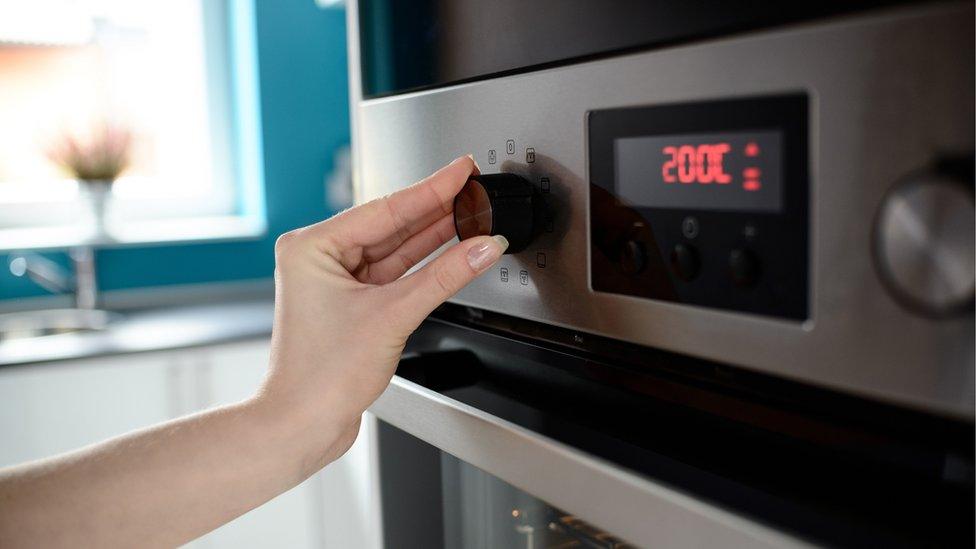The homeowners 'conned' by Green Deal firm Helms
- Published
The homeowners scammed by Green Deal firm
Mary Hunter says she was given a promise that improvements to her home would lower her energy bills at no cost to her - and that it was all backed by the UK government.
The 86-year-old thought it was a win-win situation, but it wasn't.
She now pays much more for her electricity and has a debt she is supposed to pay for another 21 years.
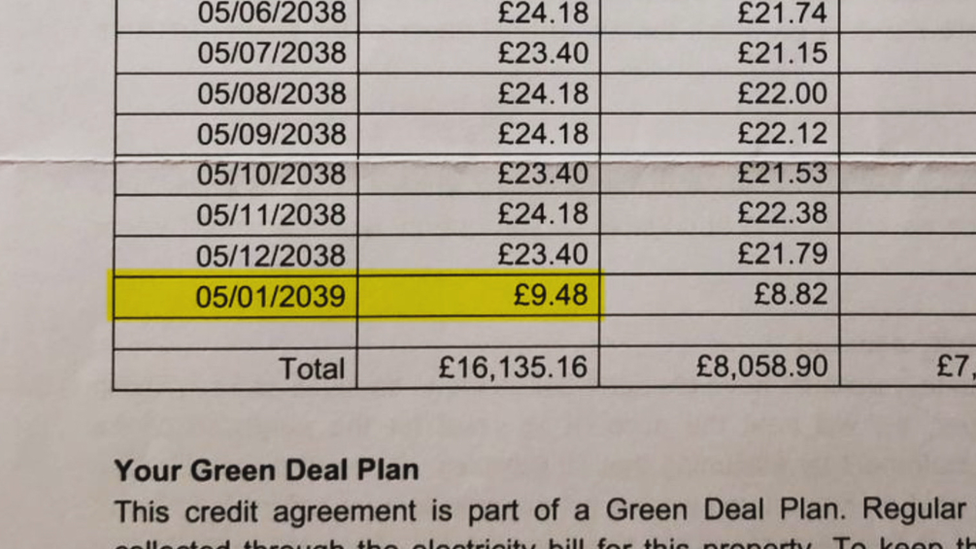
86-year-old Mary will need to pay back her Greeen Deal loan until 2039
Mary, from Balornock in Glasgow, is one of more than 3,000 Scottish households left with long-term debts after signing up for a new boiler, home insulation or solar panels with Home Energy and Lifestyle Management Ltd (Helms).
The Cambuslang-based firm were approved installers for the UK government's Green Deal drive to improve energy efficiency, which was launched to great fanfare in 2013 but withdrawn two years later.
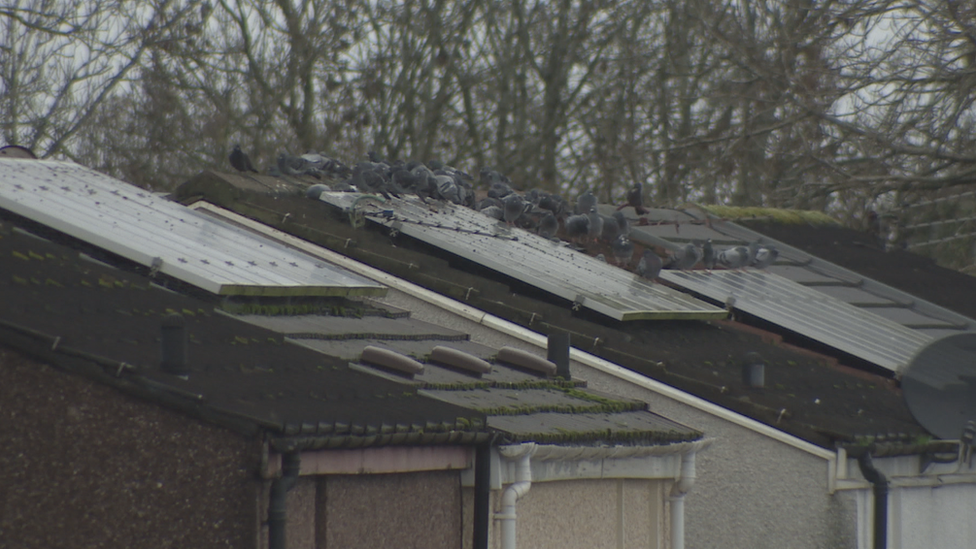
Thousands signed up to the Green Deal to improve energy efficiency
It operated long enough for thousands of Scots to sign up and many are now regretting their decision.
The "golden rule" of the Green Deal was that the instalment payments should not exceed the savings on an average bill but many homeowners have been left out of pocket, with the energy efficiency reductions having no chance of covering the expensive work carried out.
Many are tied to 25-year finance deals they claim they knew nothing about or have been left with properties that fail building regulations.
In addition, they might not be able to sell their homes as the debt is tied to the house.
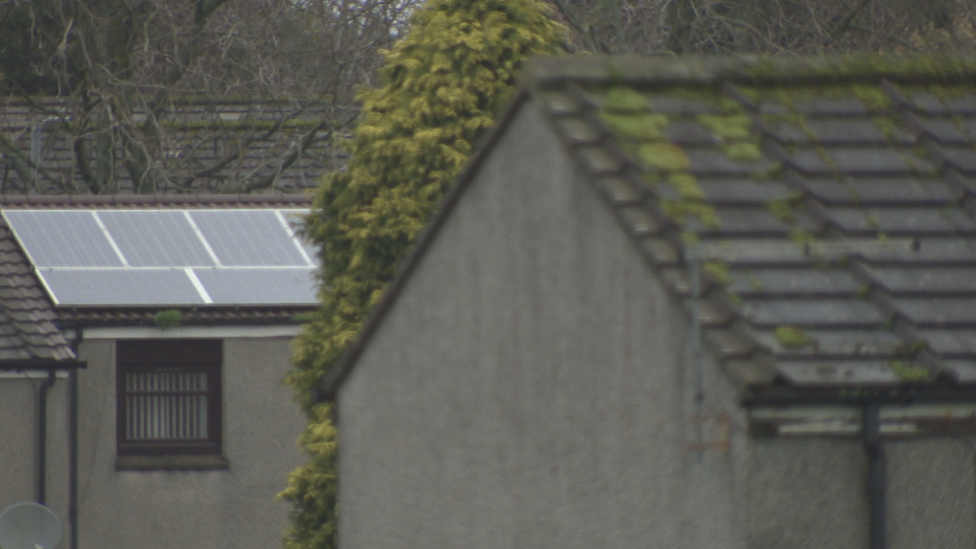
The scheme was meant to improve energy efficiency and cut fuel poverty
Citizens Advice Scotland said people complained that Helms used misinformation and "pressure-selling tactics".
Kate Morrison told BBC Scotland's Timeline programme that people had complained they were oversold the benefits of the scheme and not allowed the opportunity to review the contracts themselves.
She said she knew of hundreds of people affected, mainly in Glasgow and the west of Scotland.
Hamilton and East Ayrshire were some of the worst affected areas.
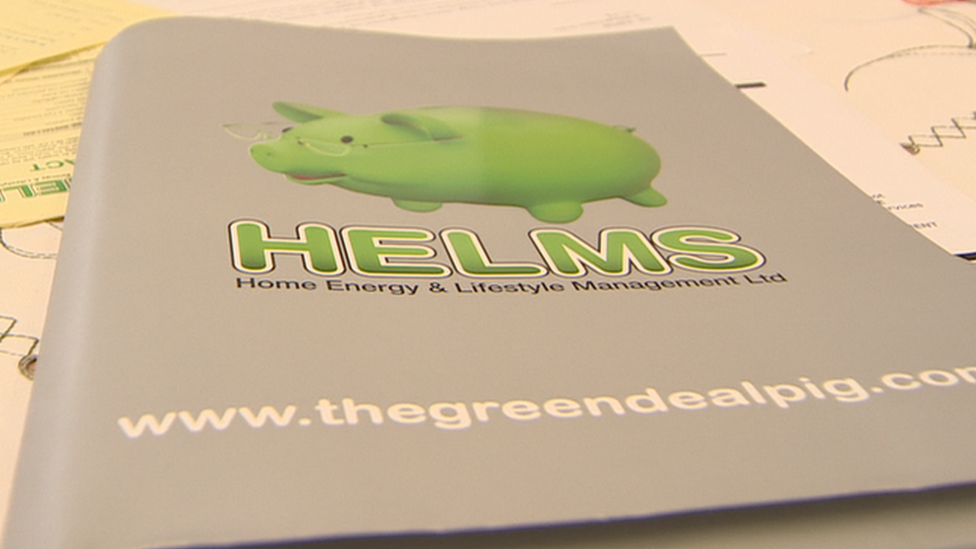
Helms was a UK government accredited Green Deal trader
Mary told Timeline she had trusted Helms because the scheme was approved and accredited by the UK government.
"They kept saying it was a government deal," she says.
"I said 'if the government is doing it, it must be alright'."
She can't believe the government would allow a company like Helms to carry out work in its name.
Helms were fined £200,000 by the Information Commissioner's Office for its sales tactics but paid just a fraction of this before going into liquidation in April 2016.
21 homes in one street
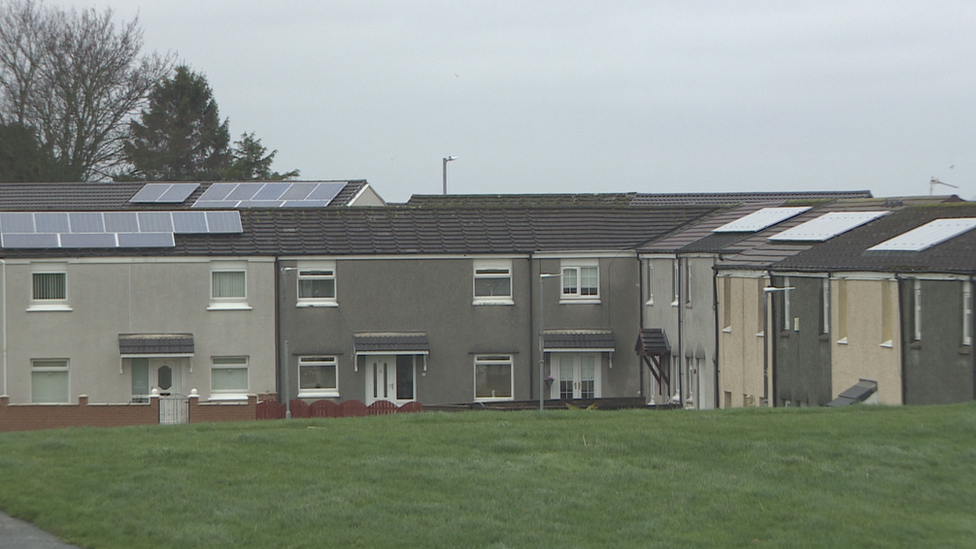
One street in the south Lanarkshire town of Blantyre has 21 homes who were targeted by Helms.
As well as home efficiency products, solar panels were often sold as part of the package.
Some government grants were available for other energy efficiency measures but not solar panels.
Those affected claim Helms said solar panels would reduce energy bills and make them money from the electricity generated by the feed-in tariff.
Many homeowners say they never saw any of the money from the power generated by the solar panels.
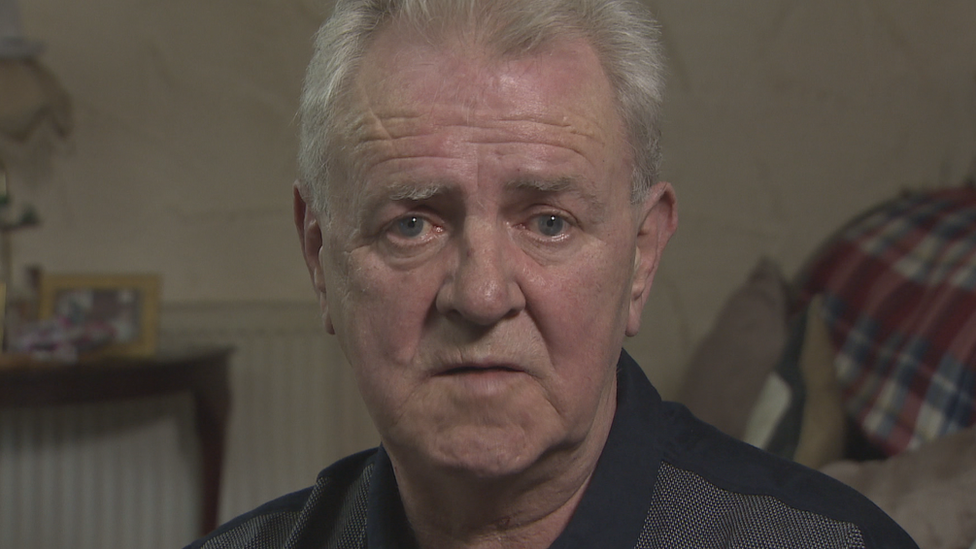
Duncan McDougall says he had never had debt in his life before this
Duncan McDougall is one of the Blantyre residents affected.
The 64-year-old says the stress of the debt is affecting his health.
Duncan says he did know anything about a payment plan for the loan.
"They told me it was costing me nothing," he says.
"I've suffered from anxiety and depression through this because I'm thinking 'how am I going to pay all this?'
"I've never had debt in my life. Everything in my house was paid by cash. Even my mortgage I pay in cash."
Duncan says he was definitely mis-sold the deal.
'You've been conned'
"The people who came in were very nice but as far as I was concerned I was not paying for this it was the government," he says.
"The only time I knew it was a payment plan was when I got a letter in from the electricity saying I was £300 in arrears.
"I phoned them up and they said to me they'd had umpteen people on the phone.
"I was talking to the manager at Scottish Hydro and he turns round and says to me 'you've been conned'."
Duncan's electricity bill has more than doubled in order to pay back the debt.
He says: "I'm scrimping and saving. I don't get much money. I'm on employment support allowance."
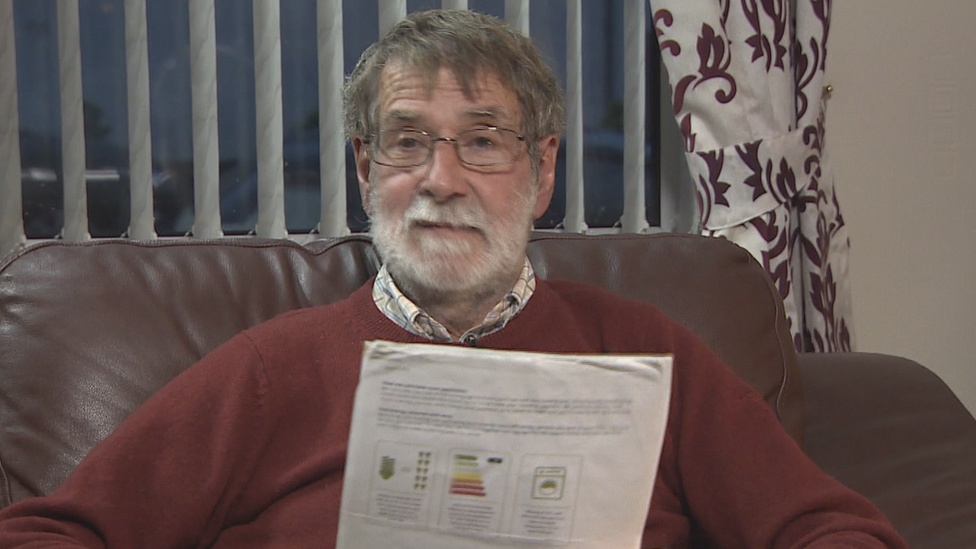
John Wotherspoon says he was given a golden promise his bills would not go up
John Wotherspoon, 73, lives on the same street as Duncan.
His bill has risen from £79 a month to £215.
John says the scheme was meant to be self-funding but the figures Helms used to calculate the savings were not realistic.
His old boiler used £60 a month for gas and the Helms advisor came up with a saving of £54.
"This is clearly impossible," John says.
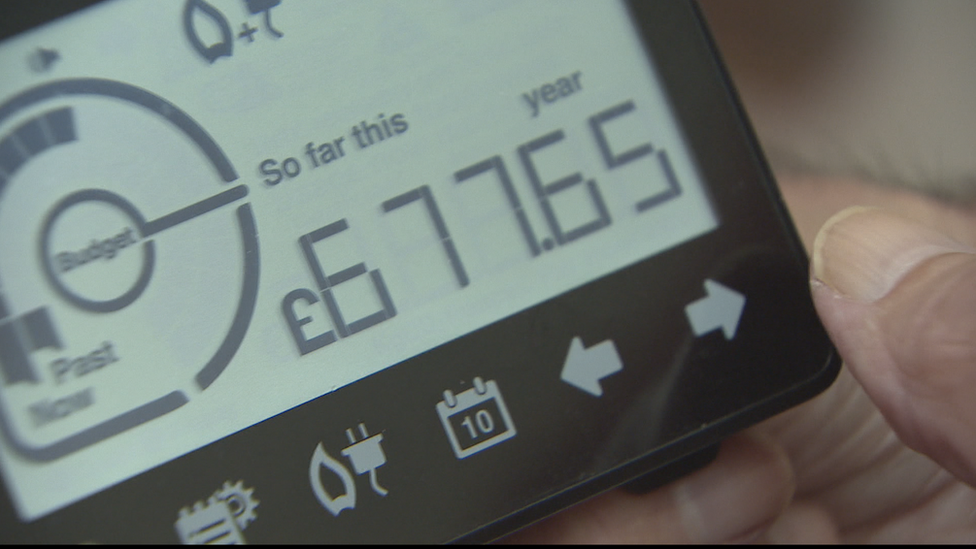
John Wotherspoon says his energy bill is more than double his usage
He claims he was misled about paying back the money because he was told the improvement would be paid from his energy bill, which would not go up.
"At the time I thought there was nothing to worry about," he says.
"This is a government scheme, would my government cheat me? Surely not.
"It seemed simple the way it was put. Maybe I was naive but I had a golden promise and it was a government scheme. I did not believe I had anything to worry about."
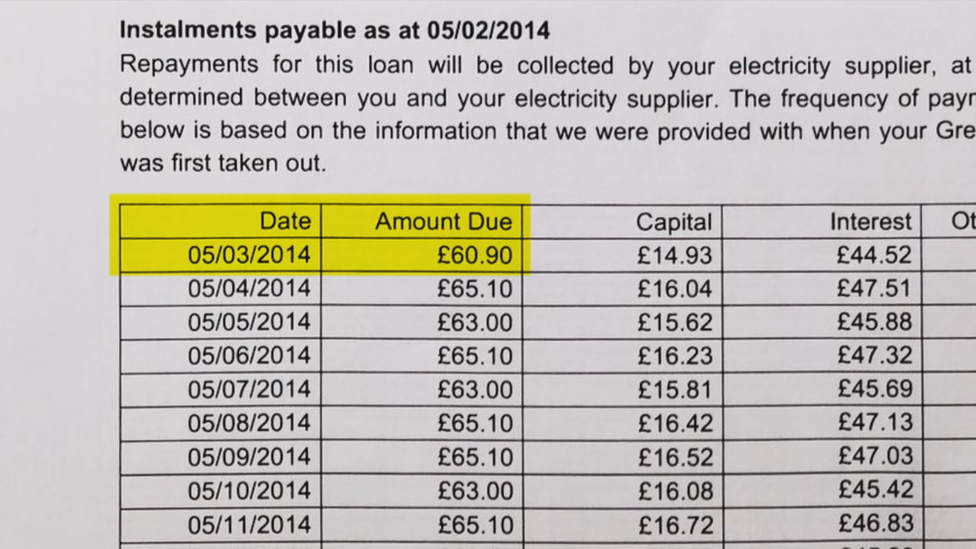
Repayments of the loan are collected through the household's electricity bill
Mary Hunter was 81 when Helms called at her home where she had lived since she was 15.
The Helms representative asked if she would be interested in exterior cladding to her timber-framed home, which would improve its energy efficiency.
"At first it was just the cladding and then he started talking about solar panels and my boiler and the attic insulation," she says.
"I told them the attic had been done a while ago but they said 'we'll get that done again'," she says.
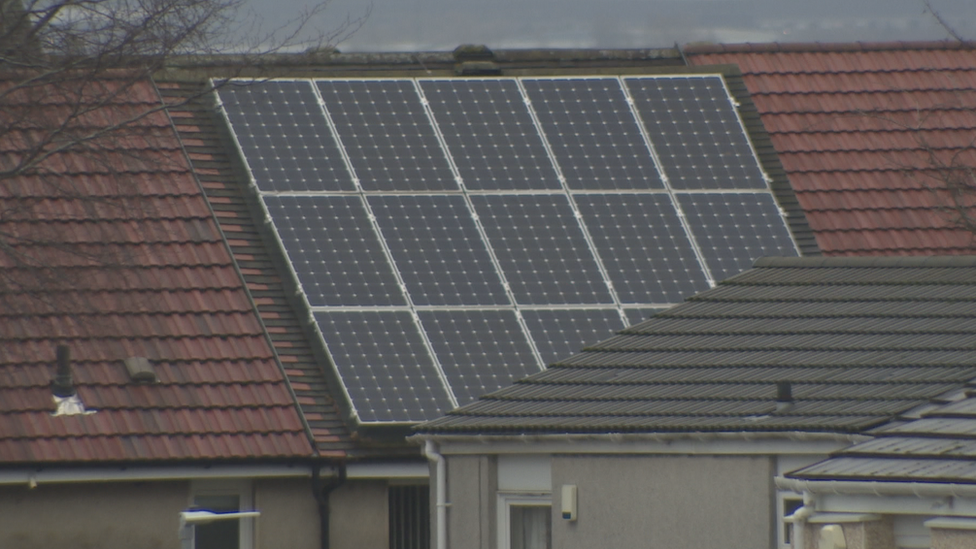
In all, the bill came to £16,000, although Mary says she did not find this out until the work was finished.
And she did not realise she would have to pay back the money.
"It's put an extra worry on to me, how it is going to be paid," she says.
"I really got a shock when I saw how it was going to be paid because it is over 25 years."
"I think I've been quite foolish and I'm not very happy with myself for getting into this.
"I wish somebody would wave a wand and make it disappear."

What was the Green Deal?
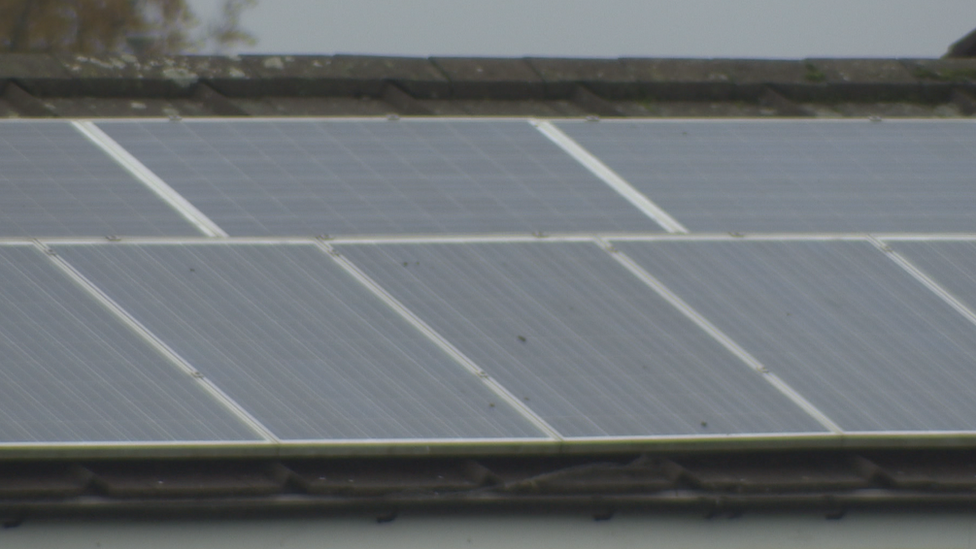
A flagship energy-saving scheme launched in 2013, the Green Deal allowed homeowners to make improvements at no upfront cost, and pay for it through savings on their energy bills.
So if your energy bills were £1,000 a year when you applied for the loan, your energy bill plus Green Deal repayments shouldn't have been more than that. But this didn't always work in practice, as some low users could have ended up paying more as they used less energy than average.
Not only that, but as the loan was attached to the home, rather than the person applying, there were fears it could make a property difficult to sell.
In July 2015, the UK government pulled the plug on the scheme, due to low uptake - only about 15,000 Green Deal loans were issued over the two-and-a-half years the scheme was open.

Hundreds of complaints
The Green Deal Finance Company (GDFC) took over the Green Deal loan book in January 2017 and relaunched the scheme.
They confirmed they had received 486 complaints about Helms.
Many of the cases are still being dealt with but more than 200 have received an offer, which would reduce or cancel their loan.
These include four people on the same Blantyre street which also has seven complaints still outstanding.
The decisions were taken because of breaches of the Green Deal Code of Practice, this includes misrepresentation and failure to ensure that any plan "is affordable to the bill-payer and meets their needs and financial situation".
However, these offers do not cover the feed-in-tariff agreements for the solar panels or resolve issues around building warrant guarantees and future maintenance.
A statement from the UK government's Department of Business, Energy and Industrial Strategy said: "Green Deal loans have helped householders make their homes more energy efficient and we have always been clear that loan repayments should not exceed savings.
"Anyone who feels they have been mis-sold should complain to their loan provider.
"If that fails they should take their case to the Financial Ombudsman Service."
- Published13 November 2018
